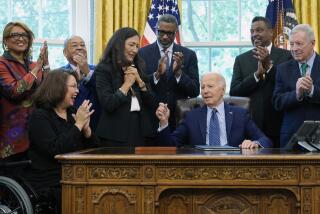Korean War Memorial Bill’s Signing Ends 7-Year Campaign
- Share via
WASHINGTON — President Reagan’s signature on a bill authorizing a Korean War memorial marks the end of a seven-year campaign by veterans of the conflict, who believe they have averted the pitfalls encountered by sponsors of the once-controversial Vietnam Veterans Memorial.
The bill, signed earlier this week, calls for appointment of a special 12-member commission to choose the design and site in the capital.
Hal Barker, son of a Marine hero of the 1950-53 conflict, said backers of the monument hope that Congress will contribute $1 million and that private gifts will make up the balance of the project’s estimated $5-million cost.
No Administrative Costs
In addition, Barker said, the bill ensures that all donations will go directly to the project, rather than pay for administrative costs. The legislation enlists the help of the U.S. Battle Monuments Commission, which could handle the project’s administrative needs as part of its regular duties.
The Vietnam memorial was financed entirely by private donations, but administrative expenses and fund-raising costs drew criticism. Moreover, the design chosen by an unofficial jury stirred even more controversy, which the Korean memorial supporters hope to avoid through an official selection process.
Jan Scruggs, a veteran who shepherded the Vietnam project on its stormy path to what is now regarded as a successful conclusion, said he doubts that the Battle Monuments Commission can raise the funds needed for the Korean memorial without private help. He suggested direct-mail campaigns and other methods.
‘Government Moves Slower’
“The last major federal effort to build a memorial was for Franklin Roosevelt, and it’s still not built,” Scruggs said of the Roosevelt proposal, which has been debated for 15 years without congressional approval. “Government just moves slower,” he said.
Col. Clayton Moran, one of four military officers serving on the 11-member staff of the Battle Monuments Commission in Washington, said the panel welcomes the Korean memorial project.
Although no preliminary designs have been proposed, Moran said, it could follow the model of the war memorial in Hawaii, which consists of a chapel flanked by walls on which the names of servicemen who died in World War II and in Korea are inscribed.
More to Read
Sign up for Essential California
The most important California stories and recommendations in your inbox every morning.
You may occasionally receive promotional content from the Los Angeles Times.











